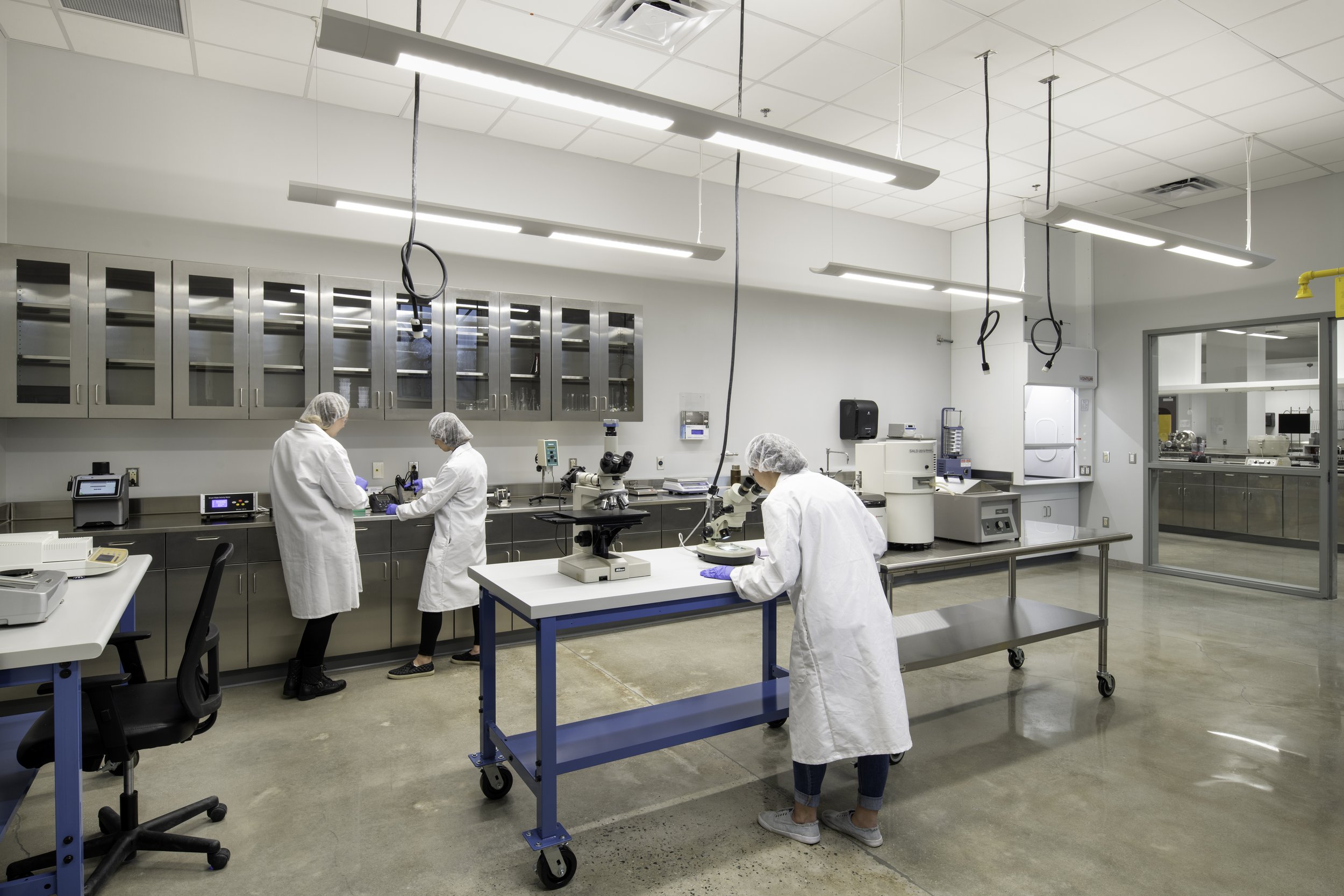Project Profile: North Carolina Food Innovation Lab
A new hub for plant-based food manufacturing advancement
Project name: North Carolina Food Innovation Lab
The North Carolina Food Innovation Lab includes a product development lab and test kitchen to facilitate brainstorming and testing formulas.
CREDIT: CRB
Location: Kannapolis, North Carolina
Size: 16,000 sq ft
Cost: $7.2 million
Project team: North Carolina State University; CRB (architecture, engineering, construction); Castle & Cooke (site developer)
Completion date: November 2019
The state of North Carolina developed a program to incentivize food processing in the state called Food Manufacturing Initiative. As part of this program, the state legislature created a food innovation lab where scientists from industry and academia could come together in partnership with economic developers and entrepreneurs to accelerate plant-based food research, ideation, development, and commercialization. They wanted the lab built to Current Good Manufacturing Practices (cGMP) standards and regulated by the US Food and Drug Administration (FDA). Four strategic partners came together to bring the vision to life, including NC State University, the NC Department of Agriculture and Consumer Services, the Economic Development Partnership of NC, and the NC Research Campus.
The result is the North Carolina Food Innovation Lab (NCFIL), a plant-based food manufacturing lab and pilot plant facility offering space for brainstorming, testing formulas, processing ingredients, and more. The facility will support every step of product development in its goal to serve as a catalyst for plant-based food research and manufacturing.
The NCFIL compromises six competencies: research, co-creation, food safety, design strategy, food processing, and marketing communications. It also offers five advanced technologies: thermal processing, extraction, milling/blending, drying, and extrusion; as well as five food categories: beverage, bakery, sauces and prepared meals, fresh or frozen fruits and vegetables, and confectionery.
The North Carolina Food Innovation Lab was designed to encourage collaboration and innovation, serving as a catalyst for plant-based food research and manufacturing.
CREDIT: CRB
NCFIL is designed to support every step of product development—from research and ideation to limited runs and packaging for the test market. The entire facility is designed for flexibility to allow processors to produce a broad variety of products in order to serve the needs of customers ranging from small startups to big companies.
With a focus on food safety, NCFIL is designed to prevent potential cross-contamination or unsanitary conditions. The pilot plant area is designed to highest possible cGMP standards, requiring tight control over access to the space. To increase visibility into the production process, the pilot plant uses cameras that go to TVs in the conference room so the process can be observed by processors. Observation windows are also used where possible to allow for in-person viewing. In addition to helping get new food concepts off the ground, the lab will host courses and workshops. The facility seeks to be a driving force for food and beverage production in the state of North Carolina.
The facility must accommodate current and future processes. This presented a challenge as CRB’s design and construction team needed to address both the current and anticipated future equipment that may be needed in the space, as well as possible future power and utilities demands.
The QA/QC lab in the North Carolina Food Innovation Lab contains workspaces and equipment to perfect a prototype before scale-up in the state-of-the-art pilot plant.
CREDIT: CRB
CRB used an ONEsolutionTM execution strategy for the design and construction of the retrofitted space. The ONEsolution strategy allowed the schematic and detailed design to occur concurrently with real-time input on constructability from strategically selected trade partners. This approach streamlined the transition from design through fabrication to construction. The integrated ONEsolution delivery focused on implementing innovative design and best construction practices to deliver the project on schedule at a target value cost.
The facility is the only food innovation lab in the country that can offer a manufacturing area that is cGMP certified. Most of the lab has been designed to comply with FDA standards, and approximately 2,000 square feet of the pilot plant space operates under strict cGMP, allowing the facility to produce small quantities or small volumes of products that can be consumed.



